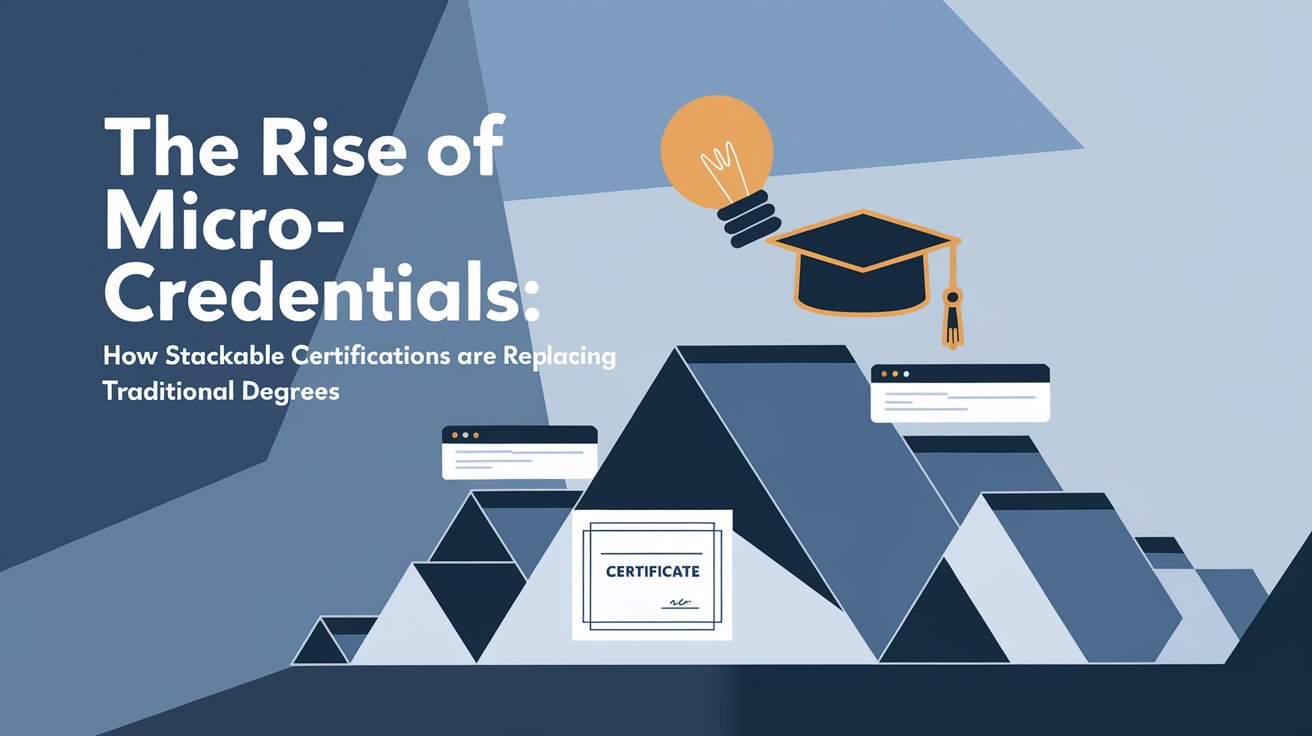By 2025, 50% of workers will need reskilling (World Economic Forum), yet traditional degrees struggle to keep pace with rapid technological change. Enter Micro-Credentials—bite-sized, stackable certifications that deliver targeted skills for today’s dynamic job market. With 72% of companies now prioritizing skills over degrees (LinkedIn, 2023), this post explores how micro-credentials are reshaping career growth.
What Are Micro-Credentials and Why Do They Matter?
Micro-credentials are focused certifications validating specific skills, such as AI programming or digital marketing analytics. Unlike traditional degrees, they are:
- Flexible: Earned in weeks, not years.
- Affordable: Costs average $200-$1,000 vs. $37,000 in average student debt (NCES).
- Industry-Aligned: Designed with employers like Google and Microsoft to address skill gaps.
Types of Micro-Credentials:
- Digital badges (e.g., Coursera’s SEO Specialization)
- Nanodegrees (Udacity’s Data Science Program)
- Stackable credentials (CompTIA’s IT certification pathways)
How Micro-Credentials Solve Modern Professional Development Challenges
Bridging the Skills Gap at Speed
With 40% of tech skills obsolete within 18 months (IBM), micro-credentials enable “just-in-time” learning. For example:
- IBM’s Cybersecurity Analyst Professional Certificate (Coursera) trains employees in 3 months for critical roles.
Democratizing Access to Education
Platforms like edX and LinkedIn Learning offer certifications at 1/10th the cost of a college course, reaching 230 million learners globally.
Enhancing Career Mobility
A 2023 Georgetown study found workers with micro-credentials earn 25% more than peers with only traditional degrees.
Micro-Credentials vs. Traditional Degrees: A Cost-Benefit Analysis
| Factor | Traditional Degrees | Micro-Credentials |
|---|---|---|
| Time | 2–4 years | 2 weeks–6 months |
| Cost | $30,000–$150,000+ | $0–$1,500 |
| Flexibility | Fixed curriculum | Self-paced, modular learning |
| Employer Recognition | Declining (45% prefer skills) | Rising (82% value certifications) |
Case Study: Amazon’s Upskilling 2025 program offers free AWS certifications to 300,000 employees, resulting in 20% higher retention and faster promotions.
Leading Platforms for Industry-Aligned Micro-Credentials
- Coursera: Partners with 275+ universities and companies (e.g., Google’s IT Support Certificate).
- Udacity: “Nanodegrees” in AI, robotics, and autonomous systems.
- LinkedIn Learning: Skill badges integrated directly into LinkedIn profiles, boosting job visibility.
- Credly: Tracks and verifies digital credentials across organizations.
Global Impact: Over 1 million professionals have earned Google Career Certificates, with 75% reporting career advancement within 6 months.
Implementing Micro-Credentials: Strategies for Success
For Professionals:
- Audit Skill Gaps: Use tools like LinkedIn’s Career Explorer to identify high-demand skills.
- Stack Strategically: Combine certifications (e.g., PMP + Agile Scrum) for hybrid roles.
- Showcase Credentials: Add digital badges to resumes, LinkedIn, and email signatures.
For Organizations:
- Partner with platforms like Pluralsight to upskill teams in cloud computing or DevOps.
- Develop internal micro-credential programs (e.g., Deloitte’s AI Academy).
Key Takeaways and Future Trends
Why Micro-Credentials Are Here to Stay
- Speed to Market: Close skill gaps 5x faster than degree programs (Accenture).
- Personalization: Tailor learning paths to individual career goals.
- Lifelong Learning: 94% of employees would stay longer at companies investing in their development (LinkedIn).
Final Recommendations
- Start Small: Earn a single certification in a high-growth field like cybersecurity.
- Leverage Employer Sponsorship: 68% of companies now fund micro-credentials (Forrester).
- Stay Agile: Continuously update skills as industries evolve.
Final Thoughts
Micro-credentials aren’t just disrupting education—they’re democratizing career advancement. By prioritizing skills over seat time, they empower professionals to thrive in the age of AI and automation. Whether you’re a marketer mastering data analytics or a developer upskilling in blockchain, micro-credentials offer a faster, smarter path to success.
Explore Further:
- Google Career Certificates
- World Economic Forum’s Reskilling Revolution
- Coursera’s 2023 Global Skills Report
The future of work isn’t about degrees—it’s about skills. What will you certify next?


















